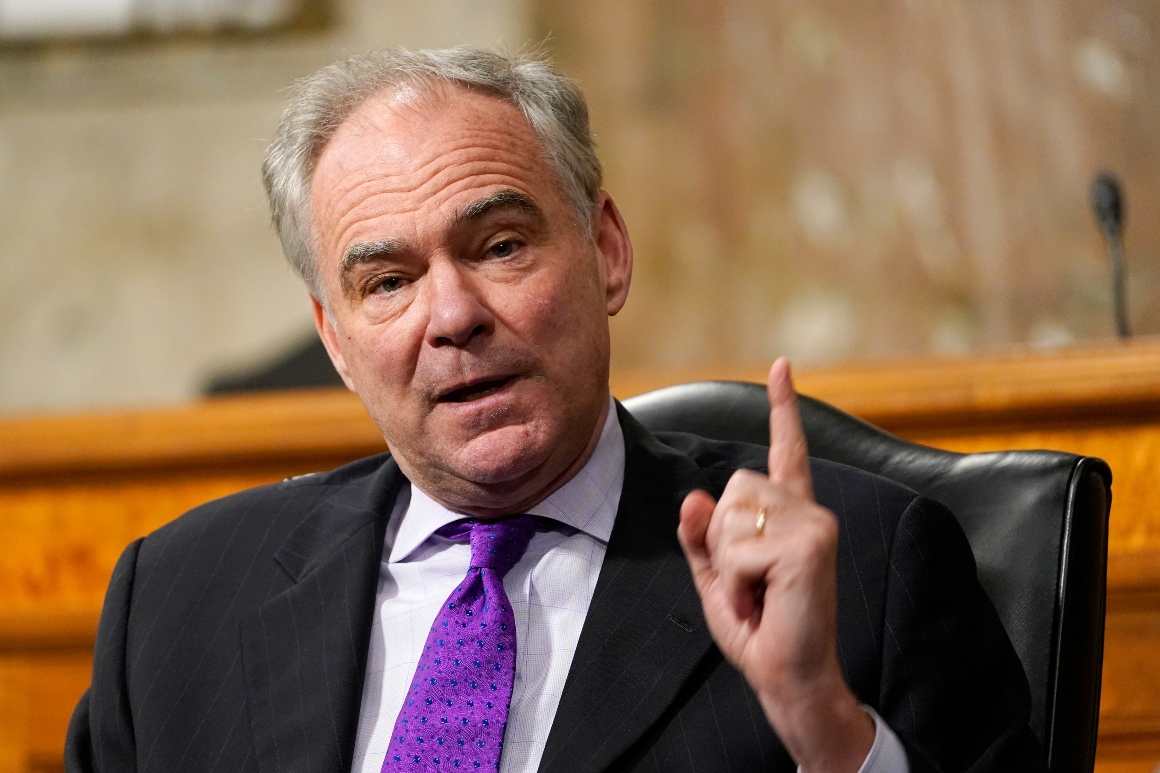President Joe Biden’s foreign policy moves in the early stages of his presidency are putting him at odds with his fellow Democrats, some of whom are mounting pressure campaigns to force his hand on some of the most vexing global challenges of the past decade.
Just last week, Biden drew friendly fire after ordering airstrikes on Iran-backed militia groups’ facilities in Syria without first seeking congressional approval, and for refusing to impose penalties on Saudi Crown Prince Mohammed bin Salman — whom Biden’s administration publicly blamed for the brutal 2018 murder of journalist Jamal Khashoggi.
It was an early sign of what’s to come for Biden: a Democratic-controlled Congress that won’t hesitate to try to rein in or pressure a Democratic president’s actions on the world stage.
“I think we need to grapple with, what more do we do” to hold Saudi Arabia accountable for the operation that killed Khashoggi, said Sen. Tim Kaine (D-Va.), a senior member of the Foreign Relations Committee who counted the slain journalist as one of his constituents. Kaine bluntly said he was “not happy” to learn that the crown prince was not among the Saudi operatives the Biden administration sanctioned last week.
Kaine has also pushed to repeal the 2001 and 2002 war authorizations that presidents from both parties have used to justify U.S. military action connected to terrorism threats. The Democratic party’s 2016 vice presidential nominee criticized Biden’s Syria strikes and the potential for a more active, tit-for-tat conflict with Iran that could escalate into a full-blown war.
“Congress is supposed to be the decision-maker here on the initiation” of strikes, Kaine said. “I shouldn’t have to hypothesize it — [the Biden administration] should come and lay out the rationale.”
Biden and those closest to him have often said foreign policy is his “first love.” A former chair of the Senate Foreign Relations Committee, he is known for respecting Congress’ role in shaping U.S. foreign policy. By not imposing penalties on the crown prince, though, the president is practically inviting members of Congress to push him to go further.
The crown prince “is responsible for the murder of Jamal Khashoggi, and if you don’t have any consequences here, it is open season on journalists,” said Sen. Ron Wyden (D-Ore.), who wrote the law requiring the release of the U.S. intelligence report that blamed the crown prince. Wyden is also pushing Director of National Intelligence Avril Haines to declassify additional documents about the operation that led to Khashoggi’s killing, though he did not go into further detail.
Democrats see a contradiction in Biden’s willingness to publish the intelligence report naming the crown prince while he declines to directly target the Saudi leader with sanctions or other punishments. Some Democrats even want the Biden administration to stop engaging with the crown prince altogether until the kingdom demonstrates an improvement in its behavior on human rights issues.
It took congressional action just to push the executive branch to name the crown prince in its assessment of those involved in Khashoggi’s murder. Given that dynamic, further measures from Capitol Hill likely will be necessary if Democrats want to overhaul the U.S.-Saudi relationship in a more dramatic way that Biden has indicated he’s ready for.
Their recent gripes aside, to be sure, Democrats are much more satisfied with Biden’s posture in the early stages of his presidency than they were with that of former President Donald Trump, whose erratic foreign policy forays frustrated lawmakers. But Democrats are taking on Biden in the hope that he will follow through on his campaign pledges, which included levying strict punishments against those responsible for Khashoggi’s killing as well as scaling back American involvement in the Middle East.
“I might have liked better [actions], but this is night-and-day different than working with the Trump administration,” Kaine said of Biden’s approach.
In a letter to congressional leaders, Biden said he ordered the Syria strikes as retaliation for Iran-backed militia attacks on U.S. forces in the region, calling the response an act of “self-defense.” The administration is briefing senators this week on both the national security implications as well as the legal rationale for the strikes, lawmakers said.
The White House has defended the decision to not penalize the crown prince directly for Khashoggi’s murder, saying it would be counterproductive to impose sanctions against a leader with whom the U.S. needs to continue partnering on security in the region.
But beyond the Middle East, Democrats had also hoped for better communication with the executive branch after years of often nonexistent dialogue with Trump. No lawmaker was perhaps more critical of those Trump-era tendencies than House Intelligence Committee Chair Adam Schiff (D-Calif.), who questioned the legal rationale behind last week’s Syria strikes and described the congressional notification process as inadequate.
“On war powers, there’s blame on both sides the last 10 years,” said Sen. Bob Casey (D-Pa.), a newly minted member of the Senate Intelligence Committee. “We need to have a robust debate on something that fundamental. We just haven’t had it.”
Making matters more difficult for Biden, several congressional Democrats — from the leadership level down to the rank-and-file — have championed these causes for decades, under presidents from both parties, and see his nascent presidency as a new opportunity for them.
Among them is Rep. Barbara Lee (D-Calif.), the lone vote against the 2001 war authorization following the Sept. 11 terror attacks. Lee was among the first to speak out against Biden’s strikes in Syria and most recently authored language in the official Democratic Party platform that called for repealing both the 2001 and 2002 authorizations. She said Biden’s military actions last week only gave her efforts momentum and she had no apologies about taking on members of her own party.
“President Biden, I think, is going to have to listen, and explain what took place,” Lee said in an interview. “I know he has sent letters. But I also believe that it just highlights the urgent need to repeal these blank checks for endless wars. I’m going to keep at it until we do that.”
Democrats were heartened to see that the Biden administration did not justify the Syria strikes by invoking the war authorizations from 2001 and 2002, which have been used by presidents from both parties to justify military action in the Middle East.
The issues prompting these early divisions between Biden and his fellow Democrats also have created unlikely alignment across party lines. Senate Minority Leader Mitch McConnell threw his support behind Biden’s Syria strikes and said the president had the legal justification to launch them. It was a mirror image of the moves by several top Republicans in 2018 and 2019 to criticize then-president Trump’s unwillingness to more forcefully condemn and punish Riyadh in the aftermath of Khashoggi’s murder.
Congress has made bipartisan strides in recent years to address some of these lingering foreign policy issues. Both chambers have previously passed War Powers Act resolutions cutting off U.S. support for the Saudi-led coalition in Yemen’s civil war, but Trump vetoed the measures.
Sen. Chris Coons (D-Del.), a Biden ally who has backed Kaine’s efforts to repeal the old authorizations, said that he supports the president’s Syria airstrikes but Congress should reassert its authority over the use of military force. That’s especially true, Coons added, as Iran continues to become more involved in the region through its various proxies.
“I do think that there is important and unfinished work to do to reconsider and refresh the authorizations that are now 20 years old, and to realign them with what we are currently doing in the world,” Coons said.


















